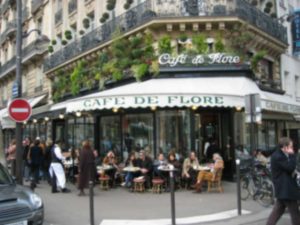A call for political renewal: New government will be well advised to encourage the French to remember the positive sides of the Grande Nation…

La vie en rose
Cafe de Flore Public Domain /wikimedia
Les Français, ils sont des raleurs,” says Catherine Tombois, who is a dedicated follower of France’s Parti Socialiste. But this time she cast her vote for Emmanuel Macron in order to block the rise of the far-right. “Les Français, ils sont des voleurs,” says Pierre Lambert about the country’s political class; he cast a Carte Blanche – an invalid vote. The political mood in France after the elections of May and June 2017 seems lodged somewhere between complainers (raleurs) and thieves (voleurs). And then of course there are the con men of the right and left – Marine Le Pen and Jean-Luc Mélenchon – who want the French to believe that they will restore France to the days of the Grande Nation with their policies of isolationism and social benevolence, a return to the nation-state, retirement at age 60 and a universal basic income. In the first electoral round – for both the presidency and the legislature – they managed to win nearly half of the French vote.
France is in the midst of major conflict, both with itself and with Germany. For Macron and many French, Germany is a blueprint to French recovery. For the extreme left and the extreme right, by contrast, Germany is once again the traditional arch-enemy that is pushing their country up against the wall, both economically and politically. Le Pen’s argument that France would one way or another be ruled by a woman – either by her or by Madame Merkel – has taken root in the minds of many French citizens. And Jean-Luc Mélenchon has named his party “La France insoumise” (France unbowed); he wants a France that opposes the German version of neoliberal capitalism.
Dismaying comparison
For the French, the comparison with Germany is a dismaying one: everything seems to be better in Germany. Germany’s Finance Minister Wolfgang Schäuble – proponent of the balanced budget and of austerity policies – and the invulnerable Angela Merkel, are a team of which France can only dream. Germany’s success has helped further erode the French political landscape. One result is the decline of France’s traditional mass parties. In the second round of the presidential election, newcomer Macron stood against populist Le Pen. Without Macron, France would have drifted to the far right.
In the parliamentary election, Emmanuel Macron and his REM movement won some 350 seats, an impressive success. In France’s first-past-the-post system, some 30 percent of the votes during the first round translated into an absolute majority in the second. Unlike his predecessor François Hollande, who was forced to join a coalition in the National Assembly, Macron will be able to rely on his own movement. After his presidential victory, Macron drew on the camp of the Republicans to reappoint Édouard Philippe as his prime minister. Economics Minister Bruno Le Maire and Budget Minister Gérald Darmanin are also from the conservative right. The Gaullist movement subsequently removed the two ministers from their party. But even this maneuver did not give the Republicans a legislative majority. The Republicans do not possess a platform that distinguishes them from Macron’s policy aims. And the Parti Socialiste as well as the left radicals and right radicals will have only a minor voice in the National Assembly.

… and in the Banlieues
Macron has succeeded in bridging the ideological gap between left and right in France. During his first weeks in office, the new president already succeeded in restoring some confidence to France. Macron’s interactions with Presidents Trump and Putin were self-assured and full of élan. This, too, won him admiration at home.
Macron’s election has laid the groundwork for political renewal in France. He has set himself five ambitious challenges. First, he aims to reunify the divided nation. This could take place through economic and political success; the long-overdue restructuring of the French economy represents both the greatest opportunity and the greatest risk for Macron’s rule. The question of security also plays a very important role in French politics. Among the first decisions of the government are measures to make the political class respectable again; the possibility for members of parliament to employ family members will be a thing of the past. And finally, Macron will have to play a decisive role in European reform.
Nepotism and bureaucracy
Macron hopes to demonstrate strength by basing important decisions on the system of ordonnances. By this fall at the very latest, the French president and his newly elected government plan to employ ordonnances (statutory instruments issued by the Council of Ministers rather than by the parliament) to modernize French labor law. Macron’s aim is to implement reforms as quickly as possible. Ordonnances permit the government to act as lawmakers for a limited period of time, thus blurring the distinction between the executive and legislative branch. It is an instrument that is anchored in Article 38 of the French constitution, and has been repeatedly employed by both the left and the right.
However, the use of ordonnances is not a means by which the nation can be reunified. The divisions that must be bridged are deep and multi-layered. They involve the relationship between rich and poor and the fears of the middle class that they are also headed for decline. The divisions also encompass the social isolation of the French elite, as well as the problems of nepotism and bureaucracy. France will also need to address the integration of immigrants from North Africa, who all speak French but still do not identify with the country. The fears of French Jews also play a role – France is home to the second-largest Jewish community in the world outside Israel. Fearing Islamist anti-Semitism, some 30 percent of French Jews cast their vote for Le Pen’s National Front. Another issue on the table is the regional reorganization of France, which includes healing the division between urban and rural areas.
But even with all the difficulties that lie ahead, France remains one of the world’s wealthiest industrial nations and possesses an infrastructure that is significantly superior to that of Germany. Above all, France is a democratic country, a country in which the rule of law, the desire for shared values, and the significance of its present and future role within Europe are matters of fundamental national importance. The new government would be well advised to encourage all its citizens to remember the positive sides of the Grande Nation.
